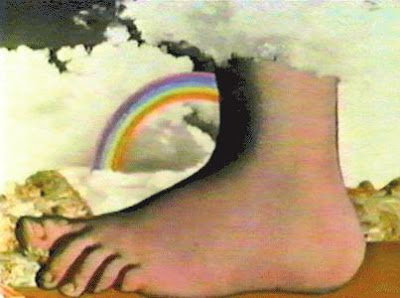2010
- Ekev sources -- revamped.
s - Is Moshe's forty day (and night) fast super-miraculous? So says Ibn Ezra. And Ibn Caspi takes him to task. And besides speculating on Ibn Ezra's methodological motivation, I wonder if it is even so certain that the Torah describes a miraculous event.s
- Fee fi fo fum! Deviating from masorah because of a French homonym -- Fi means pooh! or bother! in French. When the word precedes Hashem, should we change it to Pi? And the implications for Baruch She'amar.s
- What is the tzir'ah? Hornet or sickness? Rashi, along with midrash, and Ibn Ezra.s
- Did the Israelites have shoes in the wilderness? Pretty clearly, they did. What, then, shall we make of Rashi's comment referring to כדרך הולכי יחף שרגליהם נפוחות?
s - Luchat ketiv or Lachat ketiv? With the repercussions being which pasuk Rashi is going on. Plus, what exactly is Rashi telling us with this midrash; or what is this midrash telling us?
2009
- Ekev sources -- links by perek and aliyah to an online Mikraos Gedolos. Additionally, many, many links to meforshim on the parsha and haftara.
- God-granted power, and why it is not kefirah to believe in the water cycle. And perhaps also to believe in Darwinian evolution as well.
- Cleaving to Hashem, and different understandings of dveikus. Can one square the kabbalistic understanding, and Ibn Ezra's understanding, with the objections of the Sifrei? Meanwhile, on a peshat level, I would argue that it is meant metaphorically.
- What are the evil diseases of Egypt? Shadal identifies it as diseases particular to Egypt, based on the medical writings of Pliny. And I connect it to a midrash about Pharaoh bathing in blood.
- The variant trup on ad-avod, and why Shadal prefers our revii over the variant gershayim. And what each would mean.
- 100 blessings a day, but how many letters in the pasuk? There is one variant tradition of 100 letters, held e.g. by Baal HaTurim, but we only have 99, and Rabbenu Bachya for instance has 99. Minchas Shai discusses. This is slightly related to a post on parshat Devarim, about Rashi having a word as chaser where we have it malei.
- After you, or after them? Chizkuni makes a derasha off of a word that doesn't exist in the form he needs it to, in order to say that the water was chasing after the Egyptians, rather than the Egyptians chasing after the Israelites.
- Your feet did not develop calluses -- a followup to my 2008 post about whether the Israelites' clothing stayed fresh naturally; and how this relates to archaeological evidence, or lack there of, of a massive exodus from Egypt.
- Is the wickedness of the nations the cause, or the purported cause? Rashi and Rashbam against Ramban and Shadal about how to parse a pasuk.
- Did the Israelites' clothing stay fresh naturally? Three opinions: no, yes, and kind of.

2007
- Haftarat Ekev: In which there is an interesting poetic Biblical parallelism between YKVK and Adonai. And what this might mean.
- Some Idioms in the Parsha
- which shouldn't necessarily be taken literally. Ekev Tishmeun does not literally mean "that you will hear." Eating enemies, or "consuming" them, connoted destruction. The Finger of God; Circumcising the heart; Moshe not eating bread nor drinking water for 40 days and 40 nights.
- I'm back!
- After a short break in blogging, my return. In that post, I included a midrash from Ekev, about the scope of Noach's flood and whether it covered Har Gerizim, in which an animal driver gave a great response to a Samaritan, which caused the Pharisee Sages to apply the verse from Ekev -- בָּרוּךְ תִּהְיֶה, מִכָּל-הָעַמִּים: לֹא-יִהְיֶה בְךָ עָקָר וַעֲקָרָה, וּבִבְהֶמְתֶּךָ -- where בְהֶמְתֶּךָ is taken to mean "in your Beham," your animal driver. And a short grammatical analysis of Beham.
- Man Does Not Live On Bread Alone
- A main point of the verse is that Hashem wanted them to realize that He was the source of sustenance. Thus first He afflicted them, by exposing them to hunger, and then provided them with this food, the manna. Why? If they had bread, they would not have learned this all-important lesson. Bread is but one instance of it, but man does not live on bread. He lives on whatever Hashem deigns to grant - כָּל-מוֹצָא פִי-ה.

2 comments:
Teenage Boys From Orthodox Brooklyn Families Arrested After Public Drinking, Partying
http://hamercaz.com/hamercaz/site/news_main.php
I have posted a few times about this issue. I am shocked how many people keep saying “Yeah this is nothing new – it’s been going on since forever”. Who are we kidding? This is the THIRD TIME in a week that Frum kids have been ARRESTED upstate. No, in my days in the mountains this did not happen. Maybe there used to be one story during an entire summer and it certainly would have been the talk of the town!
Now it is happening on a daily basis! (Kudos to Hamercaz news for not sweeping it under the rug!)
Raul -
1) Pranking 911 is stupid but it does not represent a "Youth At Risk" problem
2) The other story seems to be more about our "NaNach" problem than our youth problem:
from the Hamercaz article you reference:
The adult, who is a member of the "Na-Nach" style Breslovers, had been hanging out with the boys earlier at a "Kumzitz" at a local park where they had lit a bonfire and sang songs. The adult claimed that he had not supplied the boys with any sort of alcoholic beverage. However, the officers did not believe him, and he was taken into custody.
So I think you're getting a little carried away
Post a Comment